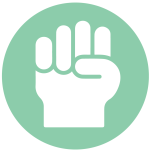Human rights and civil liberties
All people, regardless of identity or origin, deserve to live a free and dignified life. Our communities deserve governments that prioritise, protect, and enforce human rights.

Barriers to justice
Australia doesn’t have a national Human Rights Act. State and territory governments can too easily override human rights legislation that does exist.
Without strong and enforceable protections, governments can and do politicise human rights issues for electoral gain. Courts and legislatures strengthen human rights protections only for governments to weaken or override them to enable specific infringements. This cycle repeats, eroding human rights of targeted groups, and people’s trust in governments.
Protest movements have played an important role in winning many of the rights and freedoms we enjoy today. However, governments in many jurisdictions have passed laws that threaten protestors with heavy fines and imprisonment.
First Nations people and the community engaged in sustained protest to protect Djab Wurrung Country from government plans to build a highway extension disrupting sacred cultural sites. More than 60 people were arrested, including several Aboriginal land protectors. Police blocked access to the area, preventing lawyers and legal observers from entering, and there were reports a protestor’s arm had been broken.
When the right to protest is eroded, people’s ability to win and defend other rights is undermined. Criminalising peaceful protest harms democracy, our environment, and the people and communities who experience the most violations of their human rights.
Peter was passing by a climate change rally when he saw an elderly man in distress, being dragged by his wrists by riot police. His wrists were at a dangerous angle and the man was not resisting but was clearly in distress and a lot of pain. Peter had been asked to leave the road area but was extremely concerned for the safety of the older man, who appeared to be having a heart attack and was being handled very roughly by police, so he approached the man with his hands held up and open to ask if he was okay. Peter was arrested alongside dozens of people who had been attending the protest.
Whistleblowing plays an important role in our democracy, but people who are brave enough to speak up about human rights abuses and government and corporate corruption and wrongdoing often face very harsh reprisal for doing so.
People who can’t afford legal help or face other barriers accessing the legal system often don’t receive due process. When people don’t have representation in legal proceedings, this undermines their right to a fair hearing. Chronic under-funding of legal assistance means most services can’t provide the level of representation people in our communities need.
Our vision for justice
People’s human rights are protected through a legislated federal Human Rights Act. The Federal Government enacts domestic legislation to give full effect to Australia’s obligations under international human rights treaties and optional protocols.
There are mechanisms in place to ensure human rights laws are enforced, and that people can access clear remedies where breaches occur.
Australia grows a culture of compliance with human rights. All governments and government bodies consider human rights when making decisions that affect people’s lives.
All people in all communities across the continent have a strong understanding of human rights: what our rights are, and what we can do if our rights are breached.
All people can express their political views via peaceful protest without fear of police involvement or criminal sanction. Whistleblowers are protected and not punished for calling out corruption and human rights abuses.
Everyone receives a fair hearing and a voice in decisions that affect their lives. From the tribunal room to the courtroom, every person has access to the time, support and representation they need to participate fully and be heard – regardless of literacy, language, disability or economic means.







